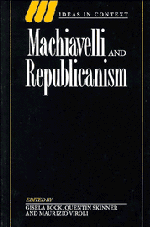Book contents
- Frontmatter
- Contents
- List of contributors
- Acknowledgements
- I MACHIAVELLI AND THE REPUBLICAN EXPERIENCE
- II MACHIAVELLI AND REPUBLICAN IDEAS
- 6 Machiavelli's Discorsi and the pre-humanist origins of republican ideas
- 7 Machiavelli and the republican idea of politics
- 8 The theory and practice of warfare in Machiavelli's republic
- 9 Civil discord in Machiavelli's Istorie Florentine
- III MACHIAVELLI AND THE REPUBLICAN HERITAGE
- IV THE MORALITY OF REPUBLICANISM
- Index
- Title in the series
7 - Machiavelli and the republican idea of politics
Published online by Cambridge University Press: 05 July 2011
- Frontmatter
- Contents
- List of contributors
- Acknowledgements
- I MACHIAVELLI AND THE REPUBLICAN EXPERIENCE
- II MACHIAVELLI AND REPUBLICAN IDEAS
- 6 Machiavelli's Discorsi and the pre-humanist origins of republican ideas
- 7 Machiavelli and the republican idea of politics
- 8 The theory and practice of warfare in Machiavelli's republic
- 9 Civil discord in Machiavelli's Istorie Florentine
- III MACHIAVELLI AND THE REPUBLICAN HERITAGE
- IV THE MORALITY OF REPUBLICANISM
- Index
- Title in the series
Summary
If there is a single point on which scholars have reached a wide consensus, it is that Machiavelli created a new theory or a new science of politics. Be it his sin or his greatest contribution to modern culture, what seems to be beyond dispute is that Machiavelli rejected the republican idea of politics and provided us with a new account of what politics is all about. Against the classical view that politics is the art of establishing and preserving a good community, Machiavelli, it has been argued, emphasised that the goal of politics is the pursuit of power and that the ‘political man’ cannot be the ‘good man of the ancients’. While several scholars have stressed that the originality of Machiavelli lies in the redefinition of the aim of politics, others have emphasised his contribution to a new methodology of political enquiry.
This agreement among contemporary scholars, could easily be corroborated by the opinions of the political writers of the sixteenth and the seventeenth centuries who called Machiavelli the corruptor of the true (Aristotelian) idea of politics and pointed to him as the thinker who transformed the most noble of humane arts into the art of tyrannical rule. For instance, Innocent Gentillet wrote that Machiavelli invented ‘des Maximes tous meschantes, et basty sur icelles non une science politique mais tyrannique’.
- Type
- Chapter
- Information
- Machiavelli and Republicanism , pp. 143 - 172Publisher: Cambridge University PressPrint publication year: 1991
- 19
- Cited by



